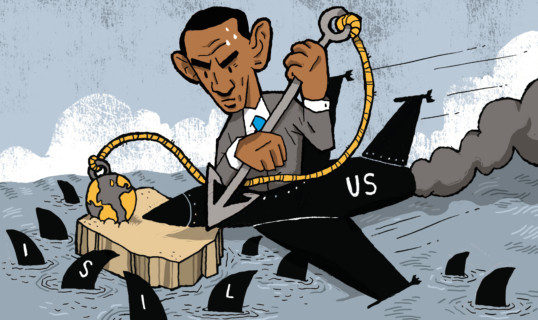
Few have given as much thought as President Barack Obama to the pitfalls of waging open-ended war on an abstract noun. On top of its impracticalities — how can you ever declare victory? — fighting a nebulous enemy exacts an insidious toll. Obama built much of his presidential appeal on such a critique — the global war on terror was eroding America’s legal rights at home and its moral capital abroad. The term “GWOT” was purged the moment he took over from George W Bush. In his pledge last week to “degrade and ultimately destroy” the Islamic State in Iraq and the Levant (Isil), he has travelled almost full circle. It is precisely because Obama is a reluctant warrior that his legacy will be enduring.
The reality is the US war on terror has succeeded where it was supposed to. Bush’s biggest innovation was to set up the Department of Homeland Security. If you chart domestic terror attempts in the US since September 11 2001, they have become increasingly low-tech and ineffectual. From the foiled Detroit airliner attack in Obama’s first year to the Boston marathon bombings in his fifth, each attempt has been more amateur than the last. The same is true of America’s allies. There has been no significant attack in Europe since London’s July 7 bombings nine years ago. Western publics have acclimatised to an era of tighter security
If this is the balance sheet of the US war on terror, why lose sleep? Chiefly because it understates the costs. The biggest of these is the damage an undeclared war is doing to the West’s grasp on reality. Myopic thinking leads to bad decisions. Obama pointedly avoided using the word “war” last week. Although there are more than 1,000 US military personnel in Iraq, and more than 160 US air strikes in the past month, he insisted on calling his plan to destroy Isil a “campaign”. Likewise, the US uniforms are those of “advisers” and “trainers”. These kinds of euphemisms lead to mission creep. If you embark on something with your eyes half-open, you are likelier to lose your way.
In 2011, Obama inadvertently helped to lay the ground for today’s vicious insurgency by withdrawing US forces from Iraq too soon. He left a vacuum and called it peace. Now he is tiptoeing back with his fingers crossed. The same reluctance to look down the road may well be repeating itself in Afghanistan. Obama went out of his way last week to say that the Isil campaign would have no impact on his timetable to end the US combat mission in Afghanistan. The only difference between Iraq in 2011 and Afghanistan today is that you can see the Taliban coming. Nor does it take great insight to picture the destabilisation of Pakistan. In contrast to the Isil insurgency, which very few predicted, full-blown crises in Afghanistan and Pakistan are easy to imagine. So too is the gradual escalation of America’s re-engagement in Iraq.
Case for containment
Obama’s detractors on both right and left want him to come clean — the US has declared a war on Isil. Why else would his administration vow to follow it “to the gates of hell”, in the words of Joe Biden, the vice-president? Last year, Obama called on Congress to repeal the law authorising military action against Al Qaida that was passed just after September 11. “Unless we discipline our thinking . . . we may be drawn into more wars we don’t need to fight,” he said. Obama is already vulnerable to what he warned against. His administration is basing its authority to attack Isil on the same unrepealed 2001 law
Why does America need to destroy Isil? The case for containment — as opposed to war — has received little airing. But it is persuasive. The main objection is that destroying Isil will be impossible without a far larger US land force, which would be a cure worse than the disease. Fewer than 1,000 Isil insurgents were able to banish an Iraqi army force of 30,000 from Mosul in June — and they were welcomed by its inhabitants. Last week Obama hailed the formation of a more inclusive Iraqi government under Haider Al Abadi. But it has fewer Sunni members than the last one. Nouri Al Maliki, the former prime minister, has been kept on in government.
The task of conjuring a legitimate Iraqi government looks like child’s play against that of building up a friendly Syrian army. Obama has asked Congress for money to train 3,000 Syrian rebels — a goal that will take months to bear fruit. Isil now commands at least 20,000 fighters. Then there are America’s reluctant allies. Turkey does not want to help in any serious way. Israel is sceptical. Iran, whose partnership Obama has not sought, is waiting for whatever windfalls drop in its lap. The same applies to Bashar Al Assad, Syria’s president.
Whose army — if not America’s — will chase Isil to the “gates of hell”? Which takes us back to where we started. Obama wants to destroy an entity he says does not yet pose a direct threat to the US. Bush called that pre-emptive war. Obama’s administration calls it a counterinsurgency campaign. Is it a distinction without a difference?
The US president’s aim is to stop Isil before it becomes a threat to the homeland. History suggests the bigger risk is the severe downside of another Middle Eastern adventure. It is hard to doubt Obama’s sincerity. It is his capacity to wade through the fog of war that is in question.
— Financial Times








